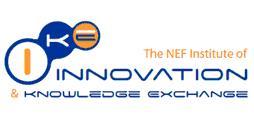A new paradigm for Further Education – The Intelligent College

The New Engineering Foundation (NEF) is proposing a new paradigm for Further Education in the report ‘The Intelligent College’ launched at its annual conference, Innovisions, held at the Royal Society in London today (Thursday 1 December 2011).
Introducing the concept of the Intelligent College Sa’ad Medhat, chief executive of the NEF, said: “Intelligent Colleges will no longer react to funding, inspection and national initiatives but will create the future through the dynamism of horizon-scanning, enterprise, knowledge transfer and civic leadership. Intelligent Colleges will respond to the needs of Industry rather than the demands of Government, they will utilise both their physical and intellectual assets to become an indispensible first-choice partner to employers and entrepreneurs.”
This think-tank report identifies the ‘golden thread’ of innovation as being at the heart of the Intelligent College and proposes eight key factors to becoming an Intelligent College:
- Establishing a customer focus and identifying clear Unique Selling Propositions
- Engaging in horizon scanning
- Establishing a progressive Continuing Professional Development Strategy
- Developing lecturers as knowledge transfer professionals
- Offering real and relevant experience
- Enabling flexible and contemporary learning
- Ensuring recognised quality
- Becoming not reliant on state funding
Although there are examples of colleges taking this transformational approach under existing structures, the report identifies three key areas for change if real progress is to be made:
Rules governing public funding – and the constraints on innovation
The adverse consequences of inspection – risk aversion and compliance
Curriculum and qualifications – quality over quantity
The report recommends greater freedom for colleges to use their resources more flexibly to meet employer needs and to be held to account for the impacts they have. Current funding/audit systems are said to:
‘…subtly but decisively drive institutions to think of their own short-term needs ahead of their real customers’ needs and priorities.’
The report criticises current regimes for quality assurance and inspection as being based on processes rather than outcomes:
They tend to address the question ‘how are we performing’ rather than ‘what are we achieving’? Because they are so reliant on quantified data, they are open to manipulation and leave colleges susceptible to ‘hitting the target and missing the point’.
The report argues that funding shapes behaviour, and calls for a more consolidated and flexible funding system enabling FE providers to plan more strategically in developing their offer. Moving towards an autonomous system with diversified income streams requires FE providers to think more intelligently, whilst ensuring accountability to their stakeholders.
It also suggests the need for an overhaul of the remit and focus of Ofsted:
‘Losing the straight jacket of outstanding, good, satisfactory and inadequate with respect to planning would be a start. The need is for inspection to be capable of understanding and assessing impact of colleges, and, the extent to which they are meeting socio-economic needs.’
On the curriculum and qualifications the report says:
‘One of the main ‘perverse incentives’ of ‘new public management’ in colleges has been the restless pursuit of increased success rates and the associated tail of assessment wagging the curriculum dog. The curriculum itself has seen some curtailing; qualifications are taught ‘to the test’. The practice of ‘assess-assess-assess’ has inhibited progress, particularly around work-based learning which is reliant on assessing skills in the workplace. The idea is to make it much more ‘assess-train-assess’.’
In his foreword of the report, Steve Holliday, chief executive of National Grid Plc, made clear the need for change in the FE sector.
“The supply and demand of skills cannot be dealt with through the techniques, structures and cultures that were designed for an era when our economy was differently balanced and far less globalised,” said Holliday.
“The Intelligent College report is a response to both the challenges and the opportunities that the future presents, by changing the conversation between stakeholders towards an innovative market-led education system.”
Natalie Thornhill






Responses